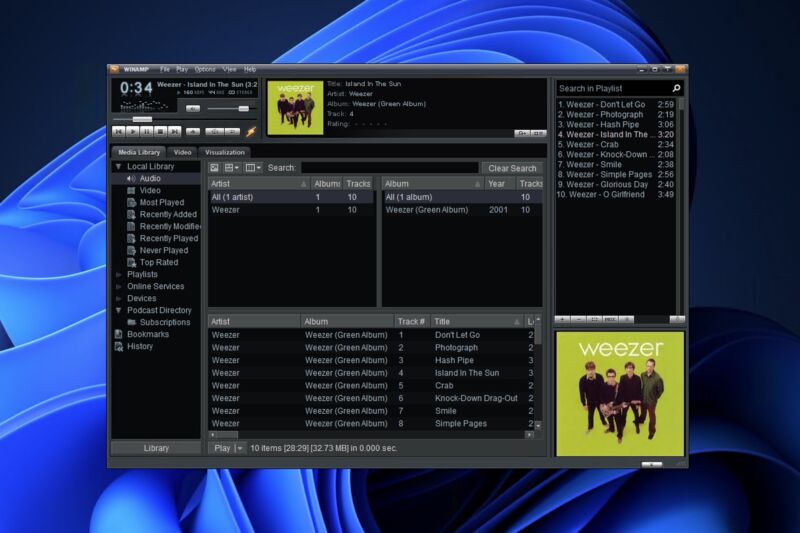
Andrew Cunningham
Back in the late 1990s and early 2000s, before the days of the iPod and the iTunes Music Store, there was an app called Winamp. People over the age of 30 will remember Winamp as the premiere music player for people using Napster, Limewire, and Kazaa to illegally download Aerosmith MP3s to their Gateway desktop computers. (For anyone younger than that: it was like Spotify, but you needed to collect every single song you wanted to listen to manually and add it to the app yourself.)
Like a lot of influential Windows 95-era PC apps, it was eventually outpaced by newer software and business models and forgotten, but it’s technically never actually been dead. Winamp’s original incarnation petered out in late 2013, shut down by AOL after years of mismanagement. A company called Radionomy bought the remains of Winamp from AOL in January 2014 and leaked an update to the app in 2016; a revised version of this build was officially released in 2018, and a major version 6.0 update was planned for 2019.
This plan obviously didn’t pan out. But last week, for the first time in four years, Radionomy released a new version of Winamp. The release notes for Winamp 5.9 RC1 Build 1999 say that the update represents four years of work across two separate development teams, delayed in between by the COVID-19 pandemic.
Most of the work done in this build focuses on behind-the-scenes work that modernizes the codebase, which means it still looks and acts like a turn-of-the-millennium Windows app. The entire project has been migrated from Microsoft Visual Studio 2008 to Visual Studio 2019, a wide range of audio codecs have been updated to more modern versions, and support for Windows 11 and https streams have both been improved.
The final release will be version 5.9, with some features targeted for release in version 5.9.1 “and beyond” (version 6.0 goes unmentioned). It requires Windows 7 SP1 or newer, dropping support for Windows XP.
That said, in our limited testing the “new” Winamp is still in many ways an ancient app, one not made for the age of high-resolution, high-density displays. This may cause usability problems, depending on what you’re trying to run it on. But hey, for all you people out there still trying to keep hope alive, it’s nice to see something on Winamp.com that isn’t a weird NFT project and a promise of updates yet to come.
Listing image by Winamp